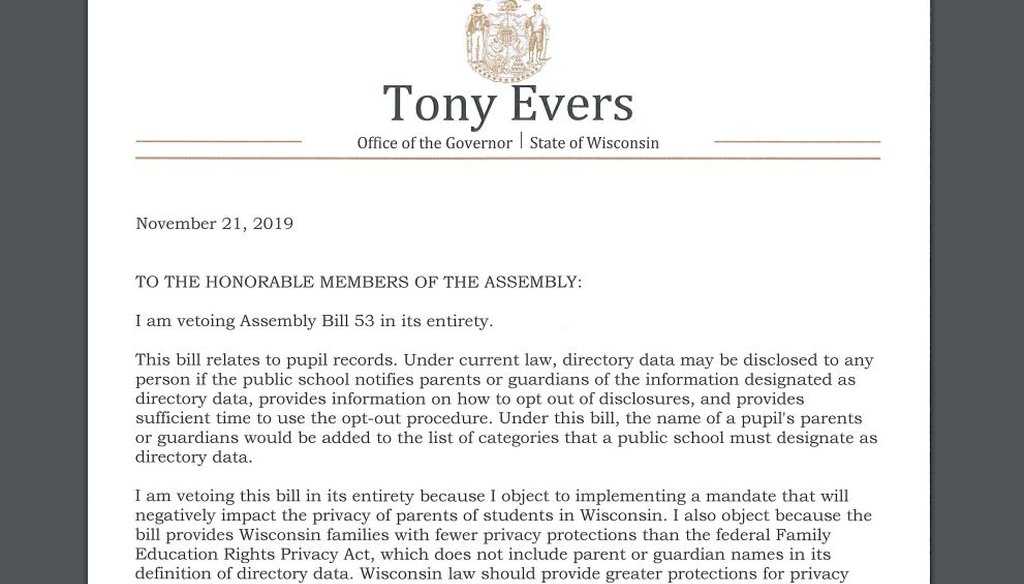Stand up for the facts!
Our only agenda is to publish the truth so you can be an informed participant in democracy.
We need your help.
I would like to contribute

Tony Evers vetoed a Republican-sponsored education bill claiming it would mandate release of parents' names. It wouldn't.
If Your Time is short
-
In 2023-24, Democratic Gov. Tony Evers signed 272 bills into law and vetoed 73.
-
There are fewer vetoes in years when the governor and Legislature are the same party. But Evers has vetoed more than typical.
-
Lawmakers are also pitching more bills, many of which don’t become law. More than 2,300 were introduced last session.
-
But Evers and Republicans reached significant compromises, including on shared revenue deal and keeping baseball’s Milwaukee Brewers in the state.
Lawmakers in the state Capitol have wrapped up their legislative work and are now in campaign mode.
As you hear from politicians who are seeking your support, they may highlight the work they did to pass bills into law — that is the primary purpose of state lawmakers, after all.
The end of a legislative session — a two-year period — is often the time when legislators highlight how many bills were signed and how many were vetoed, major proposals that passed and ones that failed.
In April, Democratic Gov. Tony Evers, who is responsible for signing or vetoing the bills that lawmakers send to him, said he was "proud to have signed 185 bills" since the start of the year.
That may seem like a fairly large number, especially after PolitiFact Wisconsin just found that Congress passed only 27 bills last year, the fewest since the Great Depression. However, onlookers of state government have pointed out that fewer bills now become law, especially with a Democratic governor and a Republican-led Legislature.
The Badger Institute, a conservative advocacy group, wrote a piece on that trend, adding that Evers has "vetoed more legislation than any governor in the last two decades."
Rather than fact-checking one specific claim from a politician or group, we decided to provide some historical analysis for how many bills were signed or vetoed in the last few years.
This also provides context for a key issue voters care about: How productive is state government?
This session had more bills signed into law, Evers has vetoed more than other governors
PolitiFact Wisconsin reached out to the nonpartisan Legislative Reference Bureau, which keeps track of what bills are introduced and how they fare.
During the 2023-24 legislative session, they said, Evers signed 272 bills into law and vetoed 73.
But those numbers don’t mean a lot unless we put them in the context of previous years. To do that, we referenced the Blue Book, which has a running list of enacted laws and vetoes each year since Wisconsin became a state in 1848.
One point of clarification: These tallies include bills from special sessions, which is when the governor calls on the Legislature to take up a specific proposal.
Let’s begin with the session starting in 2021, which included special sessions held in 2022. In all, 267 bills were signed into law, and 126 were vetoed. Comparing those numbers: In the last two years, about 79% of bills sent by the Republican-led Legislature to the Democratic governor were signed into law. In 2021-22, it was about 68%.
Now let’s look at 2019-20. In that period, 186 bills were signed into law and 20 were vetoed. While that reflects a much less eventful session due to the COVID-19 pandemic, it’s still about a 90% signing rate.
In 2017-18, it was a much different story: 370 bills were signed into law, and none were vetoed.
Former Republican Gov. Scott Walker was governor through the end of 2018, so it’s not surprising that he and the GOP-led Legislature agreed on more bills and rejected fewer.
It was a similar case in 2015-16: 392 bills were signed into law, and only two were vetoed.
All in all: Many more bills were approved than vetoed under Walker, when the Legislature was also Republican.
Still, looking farther back in the Blue Book shows Evers has typically vetoed a higher number of bills than most governors, even ones who had a different party in the Legislature.
When former Gov. Jim Doyle, a Democrat, was opposite a Republican majority in both chambers in 2003 and 2004, he signed 327 bills into law and vetoed 57.
And no governor appears to have vetoed more than 100 bills in one session, like Evers did in 2021-22.
That higher veto trend isn’t solely Evers’ responsibility, however. Republicans sometimes send him bills that Democrats call "veto bait" — ones known to have virtually no chance of getting his approval.
A small percentage of bills introduced in the Capitol make it to the governor’s desk
There’s another number worth looking at, the one the Badger Institute was referencing. That’s the number of bills that are introduced, or "proposed" by lawmakers.
Not all bills in the Capitol are sent to the governor. Many bills introduced by Democrats aren’t approved by the Republican majority, and sometimes Republican leaders don’t advance bills from their own colleagues.
So, if you’re hearing from candidates about their work, know that there’s a distinction between introducing or sponsoring a bill — and whether it was signed into law.
In 2023-24, 2,343 bills were introduced in the state Legislature. In the two years prior, it was 2,307. That is quite a bit higher than the 1,986 bills introduced in 2019-20, the 2,010 in 2017-18, and the 1,830 in 2015-16.
The Legislative Reference Bureau did note, however, that it’s now more common for companion bills to be introduced in both chambers. That means it’s the exact same bill, just duplicated for the Assembly and Senate.
So, although it might not be a perfect method to compare years, the bigger takeaway is that the percentage of bills that actually get sent to the governor for a chance at his signature or veto is pretty slim.
A look back at major bills that passed, ones that were vetoed
As we look back on the past session, Evers and Republicans came to more significant compromises than they have historically.
That included a deal to boost shared revenue for local governments, a plan to keep Major League Baseball’s Milwaukee Brewers in Wisconsin and an overhaul of the state’s alcohol regulations.
And, Republicans passed Evers’ plans for new legislative districts into law — though that was because they saw his maps as the best option compared to others that could further reduce their party’s control.
Still, Republicans were upset that Evers vetoed some of their large initiatives this year, including tax cuts. And he’s vetoed bipartisan proposals, too, such as expanding the authority of some nurses and allowing out-of-state providers to provide telehealth mental health care to Wisconsin patients.
But if you hear from politicians this summer who celebrate more bipartisanship and productivity in state government than in years prior, there were major compromises to back up those claims.
Our conclusion
To summarize: Evers signed more bills into law this past session than in his previous years as governor. He vetoed fewer in 2023-24 than in 2021-22, but he’s also vetoed more than previous governors overall.
Lawmakers also introduced more bills — 2,343 — than in recent memory. A small percentage of those bills actually reach the governor, which is an important distinction when candidates talk up their work.
Although Evers and the Republican-led Legislature have often butted heads, they reached significant compromises this year, such as the shared revenue deal.
All of this creates a complicated picture of how productive state government was last session. But it’s important context to keep in mind when state lawmakers talk about it this summer on the campaign trail.
Our Sources
X, Gov. Tony Evers, April 13, 2024.
Badger Institute, Barely one bill in 10 becomes law in Madison, April 11, 2024.
Email exchange, Legislative Reference Bureau, April 29 and May 2, 2024.
Wisconsin Blue Book, Wisconsin legislative sessions since 1848.

















































